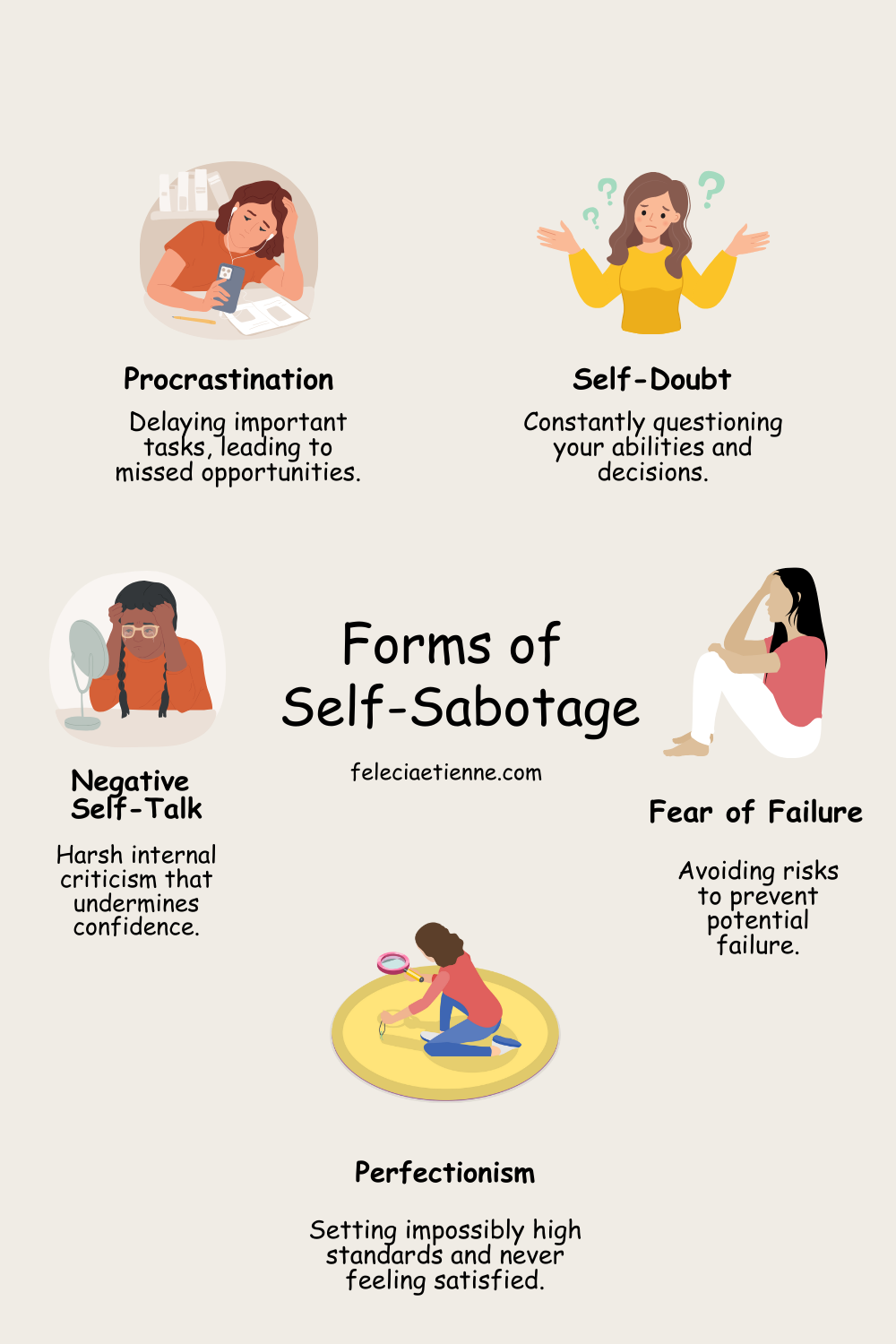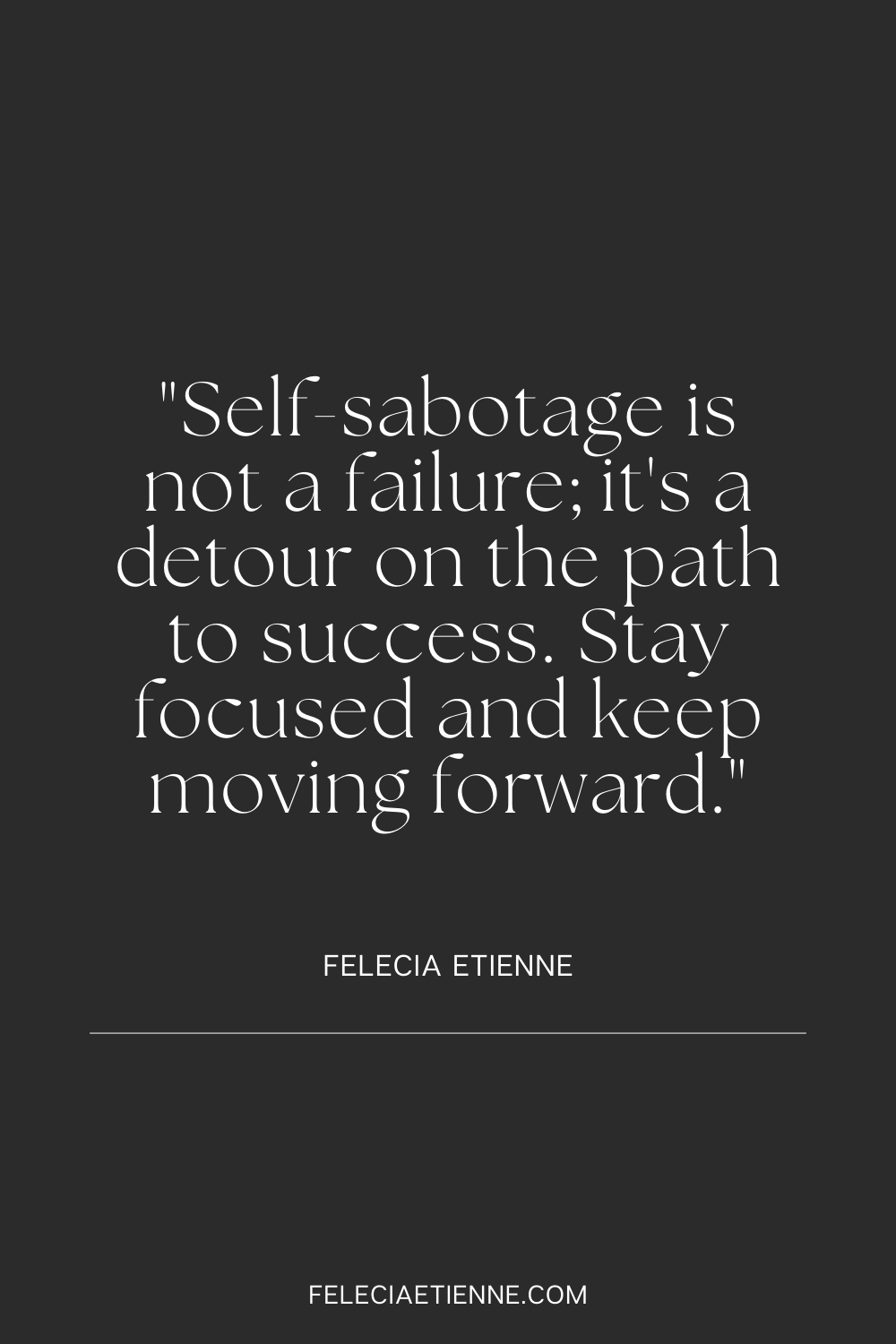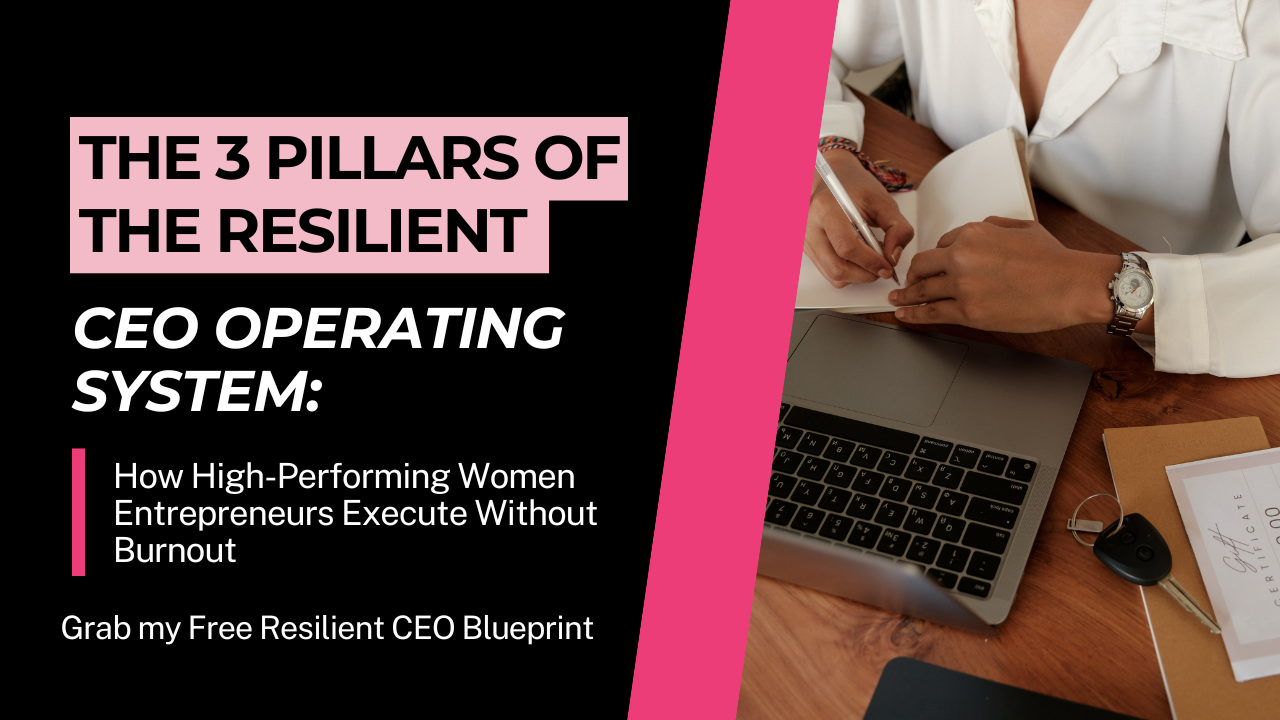Self-Sabotage: The Enemy Within - A Comprehensive Guide for High Achievers
Ever feel like your own mind is your worst enemy? Just when you're on the brink of achieving something remarkable, do you sense an invisible force dragging you down? Picture this: you're leading a significant project at work, launching a startup, applying for your dream job, maintaining a fitness routine, or excelling in your studies—only to be derailed by self-doubt. You're not alone. Self-sabotage is more common than you think.
Did you know that nearly 70% of us will battle with imposter syndrome at some stage, often leading us down the path of self-sabotage? Why do stress, dissatisfaction, and unrealized potential keep haunting you? Usually, it's self-sabotage at play. Imagine a life where your mind propels you toward your dreams instead of pulling you into a pit of self-doubt. Breaking free from this vicious cycle is possible.
Recognizing self-sabotage is your first step to overcoming it. Every small step forward is a victory, and you have the power to take that step. The best version of yourself is just around the corner. Let’s explore how to conquer self-destructive habits and unlock your true potential, creating a life filled with fulfillment. As the renowned psychologist Carl Jung once said, "Until you make the unconscious conscious, it will direct your life, and you will call it fate." So, are you ready to take that first step?
Keep pushing—you've got this!
Understanding Self-Sabotage: The Enemy Within
The Concept of Self-Sabotage
“The greatest battles we fight are within ourselves. Win those, and the world is yours.”
Have you ever heard yourself say, "I'm my own worst enemy"? If you've ever felt stuck or frustrated by your own actions, you're not alone. Self-sabotage is more common than you might think, especially for high achievers like you. But what exactly is self-sabotage, and why does it happen?
RELATED ARTICLE: 5 Common Symptoms of Self-Sabotage and Ways to Stop the Cycle
What is Self-Sabotage?
“Self-sabotage is the act of desiring a goal while simultaneously undermining our efforts to achieve it.”
Self-sabotage refers to actions or behaviors that hold us back from achieving our goals, dreams, or potential. It's not just about procrastinating on a big project. Self-sabotage involves behavior patterns—conscious and subconscious—that interfere with your long-term goals, relationships, performance, and well-being. It can take many forms, like procrastination, self-doubt, negative self-talk, fear of failure, or perfectionism. Imagine setting a goal and constantly feeling like you're in your own way. That frustration can be overwhelming, right? Essentially, it's any action that goes against what we truly desire for ourselves.
Forms of Self-Sabotage
“Self-sabotage is an unconscious defense mechanism used to protect ourselves from perceived threats.”
Self-sabotage can show up in many forms: procrastination, substance abuse, self-doubt, neglecting your health, or staying in unsatisfactory relationships. Recognizing these patterns is the first step toward change. Have you ever noticed yourself repeating the same unhelpful behaviors and wondered why?
Overcoming Self-Sabotage
“Awareness sparks the journey of change, while acceptance fuels its progress.”
The good news is, you can overcome self-sabotage. Research from the American Psychological Association suggests that awareness and self-reflection are critical. Think about what your life could look like without these barriers. Picture yourself achieving your true potential, improving your performance, building healthier relationships, and enhancing your overall well-being. Doesn't that sound amazing?
The Path to a Brighter Future
“Even the smallest shift in mindset can transform your entire world.”
Addressing self-sabotage opens the door to a brighter future. Keep in mind that self-sabotage isn't forever; it's just a hurdle you can get over with the right attitude and game plan. Take a moment to reflect. Are there areas where you feel stuck or see yourself repeating the same patterns? Recognizing these is the first step toward positive change.
With intention and effort, you can break free from self-sabotage and move confidently toward your desired life. You have the power to change your story. So, take control, embrace the possibilities, and step into a future where you are no longer your own enemy.
Why Do You Self-Sabotage?
“Self-sabotage is the enemy of progress. Recognize it, confront it, and rise above it.”
Have you ever wondered why you end up sabotaging your own success? Surprisingly, your self-sabotage patterns come from a subconscious desire for safety and familiarity. Even if it leads to success, venturing into the unknown can feel threatening. Imagine seeing an incredible opportunity but feeling paralyzed by doubt and anxiety. You retreat to your comfort zone, often at the cost of your dreams and happiness.
The Roots of Self-Sabotage
“Your unconscious mind is the captain of your ship; you must take control to steer it in the right direction.”
Fear has the power to sabotage your own success despite your best intentions. According to psychologist Dr. Ellen Hendriksen, self-sabotage is driven by a fear of failure or success, manifesting in behaviors that hinder your goal achievement. Picture the frustration of wanting to move forward but feeling trapped by your own fears. This emotional conflict leads to a cycle of self-sabotage, disappointment, and unfulfilled potential.
Breaking the Cycle of Self-Sabotage
“True freedom lies in breaking free from the limitations we place on ourselves.”
But there’s hope. You can break free from this cycle by recognizing these patterns and understanding their roots. Embrace the discomfort of the unknown and push through your comfort zone. Transforming subconscious fears into a driving force for success begins with acknowledging self-sabotage and seeking support or guidance.
RELATED ARTICLE: Breaking Free from Self-Sabotage: Embrace Action Over Confidence
Taking Action
“Your happiness is worth the effort. Push past the fear and embrace the possibilities.”
Your dreams and happiness are worth the effort. Start today by identifying when and why you pull back. Seek out a coach that specializes in mental fitness, a mentor, or a therapist if you need extra help. Embrace the possibility of success, even if it feels scary. You have the power to overcome self-sabotage and achieve the life you’ve always dreamed of.
The Costs – The Consequences of Self-Sabotage
Understanding Self-Sabotage
“Self-sabotage is not a failure; it’s a detour on the path to success. Stay focused and keep moving forward.”
Have you ever felt trapped in a cycle of stress, anger, insecurity, regret, or guilt? These feelings often stem from self-sabotage, quietly eroding your self-esteem. We may not realize the impact of our self-sabotaging actions until it’s too late. Neglecting your health or procrastinating can have long-term consequences that are hard to reverse. These behaviors don't just hurt your performance—they affect your well-being, relationships, and physical health. Understanding why we self-sabotage can help us avoid these costs.
The Impact on Your Life
“The price of self-sabotage is far greater than the cost of change.”
Imagine how much more fulfilling your life could be if you redirected the energy spent on negative thoughts or actions toward constructive endeavors. Studies reveal that beating self-sabotage leads to significant boosts in happiness and productivity. According to research published in the Journal of Behavioral Medicine, people who actively work to break self-sabotaging habits report lower stress levels and improved mental health.
Breaking the Cycle
“Take the first step, and you’ll be amazed at how far you can go.”
You have the power to change this cycle. By spotting and tackling these behaviors, you're basically unlocking the door to a more fulfilling and balanced life. The first step is awareness, followed by intentional actions to replace those destructive patterns with positive ones. Every small step you take counts toward building a better you. Remember, you're not alone in this journey. Lots of people have gone through the same struggles and come out stronger.
Take Action
“Don’t let fear dictate your future. Embrace change and watch your world transform.”
Take the step today to reclaim your potential and well-being. You deserve it.
Real-Life Examples of Overcoming Self-Sabotage
Serena Williams
Think about Serena Williams. In the world of sports, she faced self-sabotage head-on. Early in her career, she struggled with maintaining confidence on the court, often allowing self-doubt to creep in during critical moments. Maybe you've been there too, questioning yourself at the worst possible times. Serena worked with sports psychologists and focused on building a strong mental game. By recognizing her self-sabotaging thoughts and replacing them with positive affirmations and visualizations, she transformed her mindset. This shift didn't just help her rack up a bunch of Grand Slam titles and cemented her as one of the all-time tennis greats. If she can overcome self-doubt, so can you.
Oprah Winfrey
Then there's Oprah Winfrey. In the business world, her journey to success was not without its struggles with self-sabotage. Despite her immense talent and drive, Oprah battled feelings of unworthiness and self-doubt. She often found herself undermining her own success by questioning her capabilities. Maybe you've felt the same way, doubting your skills and worth. Oprah addressed these challenges by seeking therapy and surrounding herself with a supportive network of mentors and friends. She also practiced self-reflection and mindfulness, which allowed her to break free from self-sabotaging behaviors. Her knack for spotting and breaking those patterns was key to her rise as a media mogul and influential philanthropist. If Oprah can conquer self-doubt, imagine what you can achieve.
J.K. Rowling
And let's not forget J.K. Rowling. The famous Harry Potter author battled a lot of self-doubt before hitting it big in the literary world. Struggling with depression and financial hardship, Rowling often doubted her ability to complete her book. You might have your own challenges that make you question your goals. She experienced countless rejections from publishers, which further fueled her self-doubt. However, she persevered by setting small, manageable goals and maintaining a relentless belief in her story. Rowling's determination to overcome her self-sabotaging thoughts ultimately led to the creation of one of the most beloved book series in history, making her one of the most successful authors of all time. Her story shows that persistence pays off.
Overcoming Self-Sabotage: Key Takeaways
These examples show that even the most successful people have struggled with self-sabotage. What makes them stand out is how they spot these patterns and proactively work to get past them. Their stories are powerful reminders that with the right strategies and mindset, you can break free from self-sabotage and achieve your full potential. You have the power to transform your mindset and reach new heights.
Practical Steps to Overcome Self-Sabotage
Build Self-Awareness
“Self-awareness is the first step to self-improvement.”
Have you ever reacted strongly to a situation, only to wonder why later? The first step toward mastering yourself is understanding these moments. By tuning into your patterns and triggers, you can totally change your life around. Pay attention to your thoughts, emotions, and behaviors in different situations. Research shows that people who practice self-awareness tend to have better emotional regulation and improved relationships. Start today by journaling your thoughts and feelings—it might be the key to unlocking a better you.
Identify Limiting Beliefs
“Once you recognize your triggers, you can change how you respond to them.”
Ever feel like you’re holding yourself back? You’re not alone. Many people struggle with limiting beliefs—those nagging doubts that tell you, "I’m not good enough" or "I’ll never succeed." Recognizing these beliefs is the first step toward overcoming them. Imagine the possibilities if you could break free from these mental barriers!
For instance, I used to think public speaking wasn't my thing. But, after taking on a few small speaking gigs and doing well, I started to see what I was capable of. Studies by psychologists like Dr. Carol Dweck reveal that our mindset really shapes our success. Folks with a growth mindset—believing that skills can be improved—are more likely to tackle challenges head-on.
So, what’s holding you back? Start by identifying your limiting beliefs. Write them down and look for evidence that contradicts them. You’ll likely find that these beliefs are not as solid as they seem. Taking this step might feel uncomfortable, but remember, every journey starts with a single step. You have the power to change your narrative and unlock your true potential.
Take Intentional Action
“Take intentional action and get out of your own way.”
Once you’ve identified your self-sabotaging behaviors and limiting beliefs, it's time to take intentional action toward change. Set specific goals, create a support system, and seek professional help if necessary. It's crucial to hold yourself accountable and be patient with the process. Self-mastery takes time and effort, but the end result is well worth it. By taking these steps, you’re actively breaking free from self-sabotage and shaping a life that aligns with your values and goals. Remember, progress isn’t always linear. There might be setbacks, but don’t let them discourage you. Channel your inner resilience and keep moving forward.
RELATED ARTICLE: DISCOVER YOUR INNER POWER: UNEARTHING CORE VALUES, OVERCOMING LIMITING BELIEFS, AND EMBRACING AUTHENTIC IDENTITY
Practice Self-Compassion
“Don’t beat yourself up over past mistakes. Treat yourself with the same kindness you would show a friend.”
Treat yourself kindly when facing challenges or setbacks. You’re human, and it's okay to make mistakes. Have you ever felt like your own worst critic after a setback? Maybe you failed an important project at work or struggled with a personal goal. In these moments, practicing self-compassion can make a world of difference. When you treat yourself with kindness and understanding, you remind yourself that it’s okay to be human. Research from Dr. Kristin Neff shows that those who practice self-compassion are more resilient and less likely to be overwhelmed by negative emotions. So, next time you face a hurdle, remember to be gentle with yourself. You deserve the same compassion you would offer a friend in need.
Surround Yourself with Positive Influences
“Surround yourself with people who lift you up and inspire you to be the best version of yourself.”
The people you surround yourself with can immensely impact your mindset and behaviors. Seek out supportive friends, mentors, or role models who inspire and motivate you. It’s often said that you become the average of the five people you spend the most time with. Take a look at your circle. Are these relationships lifting you up or holding you back? Surrounding yourself with positive influences can truly help you beat self-sabotage and hit your goals.
Find Healthy Coping Mechanisms
“When you’re feeling overwhelmed, find healthy ways to cope rather than self-sabotaging behaviors.”
When you're stressed or uncomfortable, it's easy to turn to binge eating, drinking, or avoiding the problem. But what if you could handle these feelings in a healthier way? Try exercising, chatting with a friend, or practicing mindfulness. Research shows that these activities can help counteract self-sabotaging behaviors. Next time you feel like derailing your progress, take a walk outside or dive into a creative project. You'll be amazed at how much better you feel!
Seek Professional Help
“Asking for help isn’t a sign of weakness, it’s more like calling in the reinforcements. Don’t shy away from getting professional backup on your quest.”
Sometimes, it's tough to tackle self-sabotage on your own. Imagine trying to reach peak physical fitness without a personal trainer. The same goes for your mental and emotional well-being. Seeking help from a coach who specializes in behavior change and self-sabotage can provide you with personalized strategies and support. Think of top executives and elite athletes like Serena Williams—they rely on coaches to stay at the top of their game. You deserve the same level of support on your journey to self-mastery.
Related article: 12 Ways A High-Performance Coach Can Make You More Successful
Overcoming Self-Sabotage
“Believe in your ability to overcome self-sabotage and create a life of fulfillment and success.”
Overcoming self-sabotage takes time and effort, but with the right tools and techniques, you can do it. Start with small steps toward becoming the best version of yourself—one filled with self-awareness, positive beliefs, self-compassion, and a supportive environment. You deserve it! Begin your journey toward self-mastery today, and you might just unlock new depths of happiness, success, and fulfillment.
The Connection Between Self-Sabotage and Imposter Syndrome
“Recognize that your feelings of self-doubt and imposter syndrome may be linked to self-sabotaging behaviors.”
Do you often feel like a fraud despite your accomplishments? You're not alone. Imposter syndrome often walks hand in hand with self-sabotage, making you feel inadequate and fueling self-destructive behaviors. It's that persistent fear of being exposed as a "fraud," even though you have plenty of evidence to prove your competence. Negative self-talk and perfectionism are all too common, leading you to undermine your achievements and shy away from new opportunities.
Tips for Combating Imposter Syndrome
Recognize Your Achievements
Take a moment to list your accomplishments. Revisit this list regularly to remind yourself of your strengths and boost your confidence.
Challenge Negative Self-Talk
When you start beating yourself up with those self-critical thoughts, swap them out for some positive aligned affirmations and realistic assessment of your abilities.
Embrace Feedback
See feedback as a chance to grow, not as a confirmation of your worst fears. Every bit of feedback is just another step towards getting better.
Set Realistic Goals
Chop up your big goals into smaller, manageable chunks. This approach helps you build momentum and boosts your confidence with each small victory.
By addressing imposter syndrome and its underlying causes, you can reduce its hold on your behavior and open the door to greater self-confidence and success. Remember, you're not alone in this struggle, and taking these steps can help you overcome the enemy within.
RELATED ARTICLE: THE POWER OF IMPOSTER SYNDROME: HOW TO USE IT TO YOUR ADVANTAGE
Conclusion: Facing Self-Sabotage
In conclusion, self-sabotage is a sneaky enemy that many high achievers face, blocking your path to personal and professional growth. By understanding its roots, recognizing its signs, and using proactive strategies, you can overcome self-sabotage and unlock your true potential. Real-life examples show that with determination and the right mindset, you can conquer these behaviors and achieve extraordinary success.
The Journey to Overcoming Self-Sabotage
Your journey to overcoming self-sabotage starts with self-awareness and a commitment to positive change. It’s about recognizing those limiting beliefs, cultivating a growth mindset, practicing self-compassion, and surrounding yourself with supportive influences. Each step you take towards mastering these strategies brings you closer to a life filled with fulfillment, achievement, and genuine happiness.
Embrace Setbacks as Opportunities
As you embark on your journey, remember that setbacks are natural and are actually opportunities for growth. Embrace challenges as stepping stones to your personal and professional excellence.
Future Insights and Guidance
Keep an eye out for upcoming articles in this series, where we'll discuss how self-sabotage impacts well-being, relationships, and performance. These resources will provide further guidance and insights to support you in overcoming self-sabotaging behaviors and realizing your full potential.
Take Action Today
Start today to beat self-sabotage using the Self-Sabotage Solution Checklist for success in all life areas. Addressing self-sabotage sets you up for future excellence. This journey to self-mastery is empowering and leads to fulfillment and success. Begin now, let this free checklist guide your personal growth, and achieve greatness. You have the power to change your story with the right tools.
Ready to achieve your dream life? I’m Felecia Etienne, your go-to Certified High-Performance Coach™ and Mental Fitness Coach. Let me take you on a transformative journey with a free self-sabotage solution session. This isn’t just a chat—it’s your ticket to the high-performance tools and techniques I’ve shared with my coaching clients.
In this personalized call, you'll:
- Dive into your dreams and goals, tackle obstacles, and bridge the gap between where you are and where you want to be.
- Uncover and combat triggers of self-sabotage while discovering untapped strengths.
- You'll walk away with actionable strategies that deliver immediate impact
Equip yourself with the strategies, resources, and support needed to shatter obstacles, self-sabotaging, narrow the gap, and transform your ambitions into tangible achievements. Ready to escape inertia and boost your impact? Book a private and confidential session. Self-Sabotage Solution Session with Felecia. Let's unlock your potential together.
To find out more about Felecia, you can visit her website at feleciaetienne.com.
Social Media Handles:






























